ya, guys, you are rite, I hav cheetahs outside my back garden, and I come across elephents in the roads everyday, I hav to watch out tigers some times...there are wild animals everywhere. We are living like in a zoo.
we indeed are must closer to the nature than you guys are. There are sharks in the sea, that is true, there are baboons in some areas in the cape that "rob" your house sometimes definitely. But seeing cheetahs running around...mn...where do you get the idea?
we indeed are must closer to the nature than you guys are. There are sharks in the sea, that is true, there are baboons in some areas in the cape that "rob" your house sometimes definitely. But seeing cheetahs running around...mn...where do you get the idea?








